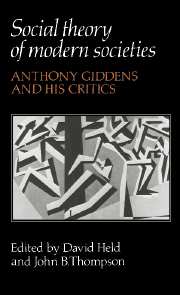Book contents
- Frontmatter
- Contents
- List of contributors
- List of abbreviations
- Editors' introduction
- 1 Social theory as critique
- 2 Hermeneutics and modern social theory
- 3 The theory of structuration
- 4 Models of historical trajectory: an assessment of Giddens's critique of Marxism
- 5 Capitalism, nation-states and surveillance
- 6 War and the nation-state in social theory
- 7 Only half the story: some blinkering effects of ‘malestream’ sociology
- 8 Citizenship and autonomy
- 9 Presences and absences: time–space relations and structuration theory
- 10 Space, urbanism and the created environment
- 11 On the (ir)relevance of structuration theory to empirical research
- 12 A reply to my critics
- Select bibliography
- Index
6 - War and the nation-state in social theory
Published online by Cambridge University Press: 24 November 2009
- Frontmatter
- Contents
- List of contributors
- List of abbreviations
- Editors' introduction
- 1 Social theory as critique
- 2 Hermeneutics and modern social theory
- 3 The theory of structuration
- 4 Models of historical trajectory: an assessment of Giddens's critique of Marxism
- 5 Capitalism, nation-states and surveillance
- 6 War and the nation-state in social theory
- 7 Only half the story: some blinkering effects of ‘malestream’ sociology
- 8 Citizenship and autonomy
- 9 Presences and absences: time–space relations and structuration theory
- 10 Space, urbanism and the created environment
- 11 On the (ir)relevance of structuration theory to empirical research
- 12 A reply to my critics
- Select bibliography
- Index
Summary
The history of the twentieth century has often been written as that of a ‘century of total war’. Centuries are not, of course, socio-historical periods. But the idea of ‘total war’ expresses a dominant reality of a major period in the history of modern society: from the 1890s to the 1950s, the period of the build up to, fighting and aftermath of the two World Wars. It can also be argued that the most important group of questions about late-twentieth-century world society is whether and in what sense we have superseded, or can supersede, the period of total war.
In the history of twentieth-century social theory, however, war hardly figures. Our most important writers have continued the debates of nineteenth-century thinkers about industrialism and capitalism, recognizing war as an event external to the main processes of social change – if at all. The late-twentieth-century boom in sociology, even radical and Marxist, has uncritically taken 1945 as the baseline of modernity, failing to reflect on the processes of war which determined this major rupture in social history.
This failure goes beyond sociology to encompass other disciplines and orientations in social science and the humanities. It is not a secondary or minor problem which can be met simply by partial adaptations of the social sciences, for example by developing a new sociology, geography or philosophy of war, however useful the contributions which these may make. It is a central issue in the interpretation of modern societies, a key problem of social theory in general.
The virtual absence of the problem of war in any mainstream tradition of social thought has many ramifications.
- Type
- Chapter
- Information
- Social Theory of Modern SocietiesAnthony Giddens and his Critics, pp. 129 - 146Publisher: Cambridge University PressPrint publication year: 1989
- 3
- Cited by



